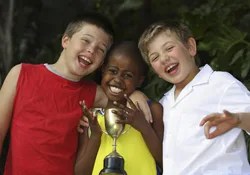As parents, we want our kids to feel good about themselves, and to be spared from self-doubt and heartaches. This is manifested in the philosophy of rewarding everyone for simply “showing up”. This societal trend to avoid calling attention to top performers in youth sports or the elimination of academic honors like valedictorian so that others will not suffer hurt feelings can actually have the opposite effect when it comes to children’s self-esteem.

Children under age 5 are generally unable to comprehend the difference between superior performance and what is simply a good effort. However, soon after, they can understand the reasons why top performing players or the team with the best record are singled out for recognition and reward. At that point in their lives, “participation trophies” become meaningless to them anyway.
Children need to be able to experience competition, to strive to be better and to deal with and process their emotions when they are not celebrated as the best at some particular activity or skill. While it is certainly understandable why parents want to shield their children from life’s sometimes harsh realities, healthy self-esteem comes from one’s experiences in dealing with the real world — and that means accepting the good and the bad.
We want our children to be able to fend for themselves in the grownup world, to understand the rules of the game when it comes to life’s everyday challenges. If kids perceive that they will be rewarded for their participation no matter the result, what incentive do they have to push themselves towards ever greater achievement? Doesn’t the message we are sending become that you really don’t have to try your best? Constant rewards for average results give children a distorted view of themselves, which will not serve them well later in life.
Children can learn as much, if not more, from losing than from winning. For starters, it can help motivate them to improve, and to develop better strategies for competing. It can also lead to a child deciding that baseball, for example, might not be the best fit for their particular talents and to set out to find something new that might be a better match (and something at which they might excel).
It is also valuable for children to study their peers and the reasons behind their achievements. Parents can discuss with their kids what makes him/her so good at soccer or other activities. What qualities do they possess that lead to such success? It is exceedingly rare for these top performers not to have significant amounts of dedication, hours of practice and training, self-motivation and hard work behind their victories. Isn’t that a valuable lesson and a good thing for our children to see and understand?
We are all familiar with stories of youth sports coaches who emphasize a “win at all cost” mentality to the impressionable children in their care. Understandably, many parents are conflicted about how best to help their children prepare for a world that is highly demanding and competitive.
While we want to motivate our kids to work hard while at the same time being confident and comfortable with their individual talents and capabilities, we also fear that they will suffer from too much pressure if we push them too hard. This can be a difficult balancing act for both parents and children alike. In the final analysis, there will always be winners and losers. And, for many children, the purest joy and satisfaction comes from being actively engaged in the activities that make them happy, no matter the final outcome.
LORI BARRETT is a mom and founder of Thinkertots, an education and stimulation program for children birth to 5 years — with locations in Bayside, and a franchise location in New Hyde Park, NY. For more info, call 1-877-TOTS-444, or visit www.thinkertots.com.





















